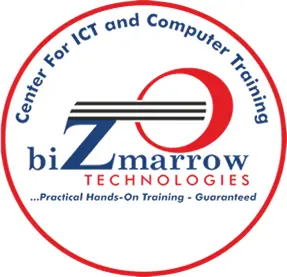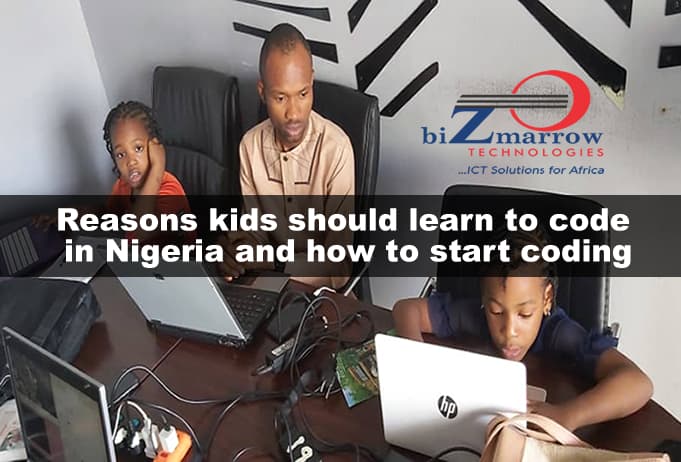Coding is the in thing now, almost every child wants to learn how to code. But what are the reasons kids should learn how to code in Nigeria?
Have you found yourself wondering, “What’s with all the hype about programming and coding lately?”
With over 1 million Computer Science, coding and programming jobs expected to go unfilled by 2030, educators and parents have realized that coding has become as vital as reading, writing, and math. For modern students who will be entering universities and the workforce in the next decade, it’s a basic literacy–one we can’t afford to overlook.
If we want to set our children up for academic success, every child should learn to code. Coding for kids not only helps improve their mathematics and writing skills but also gives them valuable skills in life and eventually in the workforce.
There are various reasons why coding is important to learn and why coding should by kids from an early age. The earlier children learn to code, the better their chance at success.
What Is Coding For Kids?
Coding for kids is the collection of opportunities available for children to get involved in coding. These opportunities aim to be fun and gamified to keep the young mind engaged.
And while it is difficult to imagine a young brain learning something seemingly complex, coding for kids is reality—thanks to the many coding summer camps, websites, ICT for Kids, and toys, coding can be quite digestible.
Start with the why, outline the benefits, define key terms, study examples, choose a language, and get started!
Wait. What is coding, simply? Coding is how we communicate with computers, and what we use to build and run websites, apps, games, and more.
How To Get Your Child To Code?
It’s an answer that can go a million different directions.
So, let’s start by focusing on moving one direction—forward. It doesn’t have to be a giant leap. In fact, per the above, it should really only be a small step for now.
The important thing is that with each move, your child experiences progress.
Our Coding for kids and ICT for Kids classes in Nigeria are structured to get your kids started from the scratch . It could start like a game, down to the basics of programming like HTML, CSS JavaScript etc
Now lets look at Reasons kids should start coding & how they can find success
Are you ready,
some people have wondered if coding is really good for kids, or is it that people are doing it just to belong? are parents registering their kids in coding classes just to show that their kids are doing somethings “Nice” in the digital age?
Lets look at some facts
Is Coding Good For Kids?
Years ago when all of this kids and code chatter started, you could have characterized it has hype because the whole idea was new and novel to the education system. And, while this “learn to code” popularity spike wasn’t unfounded by any means, time was really the only thing that could tell us if it all was going to be a big fat flash in the pan.
Well, here we are.
Time has passed, yet we are still seeing STEM education stats like by 2025, 3.5 million STEM jobs will go unfilled. And others like 71% of all new jobs in STEM are in computing, but only 8% of STEM graduates are in Computer Science. People are still wondering if coding is hard to learn.
We’ve officially moved beyond simply saying “coding is cool, so go do it,” end of story. Instead, we are now saying, “coding is in fact cool,and your future depends on it so go do it, but you should also go do it because you’ll be rewarded as a result.”
In other words, there are jobs, lots of them—and jobs that pay very well.
What makes this even better is that it’s not just the jobs or the coolness, either (this would be a much shorter blog post if that were the case). But also the creativity, problem solving, collaboration, communication, and other skills ripe for improvement as byproducts of kids learning to code.
So here are the Reasons kids should learn to code in Nigeria
The Benefits and importance Of Learning Coding ?
Coders are in high demand
As mentioned, according to Code.org, 67% of all new STEM jobs are in computing, yet only 11% of STEM graduates are in Computer Science. That’s a serious shortage of CS majors.
Coding provides a competitive advantage when applying to colleges, internships, and jobs
If you possess a hot skill that many of your peers lack–such as the ability to code–you instantly appear more desirable in the eyes of potential college admissions officers and employers. Plain and simple.
With coding knowledge, students better understand the world around them
Most of us don’t know the first thing about what makes our smartphones, laptops, social media networks, and video games run. Basic programming knowledge can change the way we interact with the technologies we use (and take for granted) daily, and can open our eyes to the infinite possibilities of coding.
Coding is fun and satisfying
While programming is logic-based, it’s also an extremely creative activity. If you know how to code, you can develop the aforementioned apps, video games, websites, and more!.
For many developers, part of the appeal of coding is the challenge and reward of seeing their code come to life after a good debugging session. Don’t be fooled, however–with the right instruction, getting started with programming can be easy and fun.
Coding improves creativity
When you learn a language, you use it to express yourself. The same is true with code. Computer coding empowers kids to not only consume digital media and technology, but to create it.
Instead of simply playing a video game or using an app, they can imagine making their own video game, or envision what their own website, or app might look like—and they’ll have the outlet for expression.
Coding improves problem solving
Coding helps those who are into it to improve their problem solving. When kids code, they take complex problems and break them down into smaller parts.
Kids learn what it’s like to approach a problem the way a software engineer does, with logical, computational thinking.
As Dan Crow, CTO of SongKick explains, “Computational thinking teaches you how to tackle large problems by breaking them down into a sequence of smaller, more manageable problems.” This logical thinking is a powerful tool in school, work, and life.
Coding improves persistence
Learning to code, like any new discipline, is a challenge. Thus, tackling complex problems—and making mistakes along the way—can be very frustrating.
Coding teaches the valuable skill of persistence in the face of such challenges. Learning how to problem solve and look for solutions through research and collaboration builds this highly desirable skill.
Coding improves collaboration
Every student can learn, and every student can learn how to code—kids can learn alongside others of every race, gender, or background. Kids meet and learn how to collaborate with all kinds of peers, all joined by a common interest in technology.
Many games, like Minecraft, also offer a bevy of educational benefits because they too involve coding, collaboration, and participation—with peers all over the world.
Coding improves communication
Communication is an absolutely essential skill throughout school, work, and life. People who can clearly communicate complex ideas in simple terms tend to be successful in different industries and walks of life.
When kids learn how to code, they learn how to communicate with the most simple-minded audience imaginable: computers. As mentioned, computer coding teaches kids and youths how to break down complex ideas and arrange them in a way that computers can understand.
Why is learning to code so important? For us, creativity tops the list! We love the creative games and activities our kids can create with coding. Coding doesn’t have to be boring, in fact, coding can be fun! We show you how to make coding fun for your kids in our coding for kids classes and code bootcamps in Nigeria
Which Coding Languages Are Best? Which Programming language should your child start with
1. Scratch & other visual programming languages:
Best to get kids excited about coding
When it comes to coding for kids and programming for kids in Nigeria, visual programming languages like Scratch provide a solid foundation of programming principles, with kids and children being able drag and drop code blocks to animate characters, create games, and build apps.
Featured course:
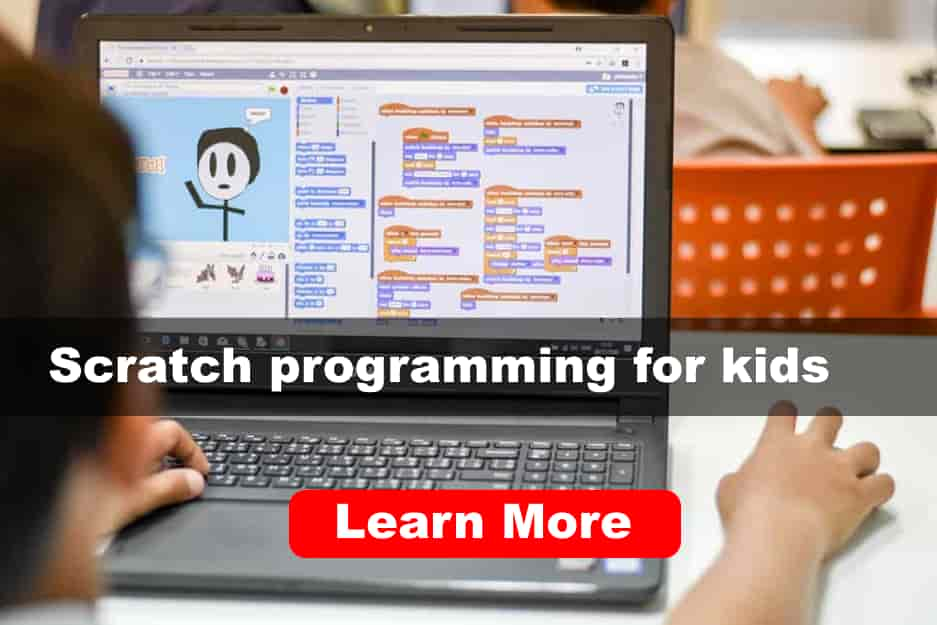
2. JavaScript, HTML, CSS
Best for building a website
Kids Coding – Introduction to HTML, CSS and JavaScript!
JavaScript is an object-oriented and procedural programming language that’s used for front-end or client-facing applications, meaning its actions are executed on the user’s computer.
The language is very popular, supported by many users (and jobs!), and is native on all web browsers. JavaScript is most commonly used to make complex and interactive web applications together with HTML and CSS
More and more people are learning to code, so do you want your kids to not have the same opportunities as others? This course offers your kids a competitive advantage.
Featured course:

3. Lua (for Roblox Programming for building games)
Best for game programmers
Created in Brazil, Lua (which means “moon” in Portuguese!) is a lightweight coding language designed to be embedded in applications. It’s a multi-paradigm language, meaning it has a set of general features that can be applied to many issues. With a short learning curve , ease of embedding, and rapid execution, it’s an ideal choice when it comes to learning how to code a game.
In fact, Lua was the most popular language to use in game engines, according to GameDev.net, and it won the Gamasutra Frontline award for best programming tool.
Featured course:
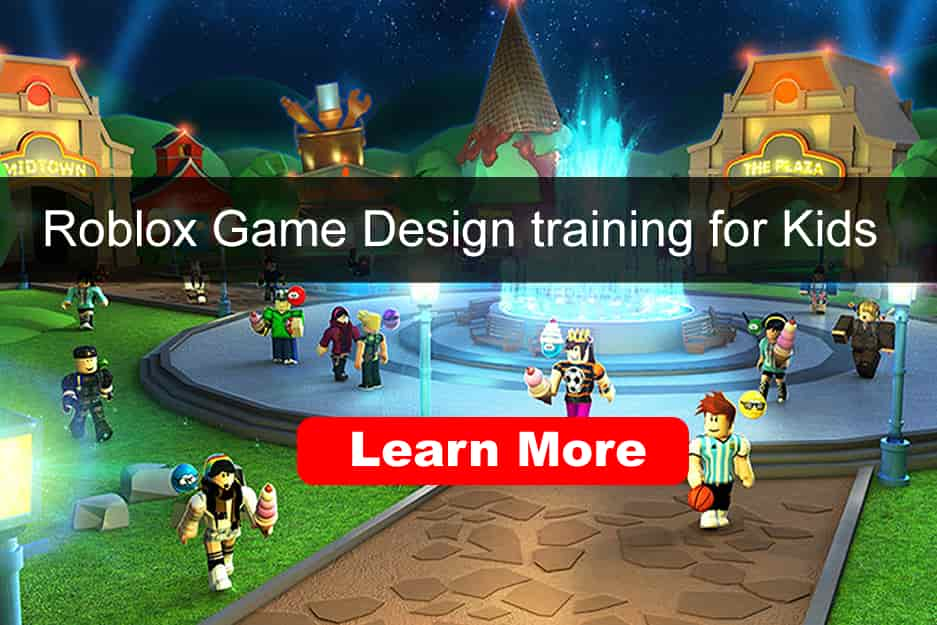
Python
Best for beginners (and for versatility!)
Named after the comedy series Monty Python, Python is considered one of the easiest coding languages to learn, in part because of its simplified syntax and focus on whitespace. Python requires fewer lines of code to get up and running, so even beginners can start creating relatively quickly.
Companies like Google and Disney use Python, and it’s very popular in scientific fields, where individuals are scientists first and programmers second. This language can be used to develop video games, web frameworks, and many scientific and numeric computing projects.
Python programming is great for kids, and is also versatile enough to be used in intricate fields like cybersecurity and artificial intelligence. Now that’s a flexible and powerful language!
Featured course:
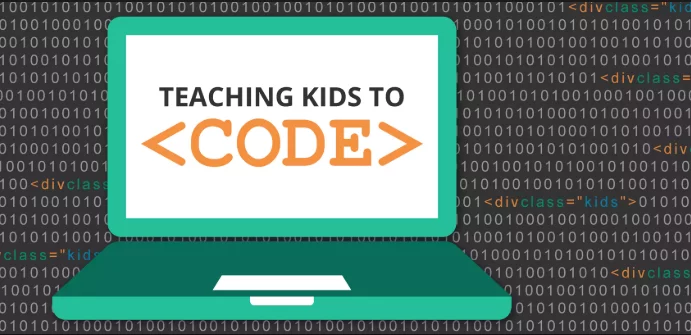
What Are Some Definitions you and your kids need to understand?
Learning a new language is difficult because without meaning, words are literally just random combinations of letters.
You have seen Reasons kids should learn to code, but they need to know what they are going into. It’s not enough to just be able to pronounce something—you need to be able to understand what each and every word means in order to form a logical statement.
So, let’s dive into a few of the major terms your kids and teens are likely to encounter as they first embark upon their coding journey.
Coding Definition
Computer coding is the use of computer programming languages to give computers and machines a set of instructions on what actions to perform. It’s how humans communicate with machines. It’s what allows us to create computer software like programs, operating systems, and mobile apps.
Simply put, coding is used for communicating with computers. People use coding to give computers and other machines instructions on what actions to perform. Further, we use it to program the websites, apps, and other technologies we interact with every day.
Programming Definition
Does your son or daughter have a dog? Has your family tried to train that dog?
The goal being, of course, is that you reach a point where you give a command and the dog responds appropriately based on your instruction. “Sit.” “Stay.” “Roll over.”
When it comes time for your kids to write a program, or program, they are doing much of the same. They, as the “owner,” are communicating a set of commands to a computer, with the expectation that the computer will respond accordingly.
Of course, the difference here is that, instead of sternly vocalizing those instructions with a liver-flavored treat hidden in their hand, kids will be writing instructions in a language that kind of resembles familiar English, but has a few additional parameters and rules.
Yes, training a dog is difficult, but take comfort in the fact that if your child’s programming command is given correctly, the computer will always listen. Success with a dog could hinder on the presence or absence of a nearby, pesky squirrel.
Programming is the foundation of robotics, video games, apps, computer graphics, and much more. And, every one of these programs is a set of instructions; a sequence of short commands, one after another, with programming used as the tool to write and disseminate those individual instructions.
Programming language Definition
Based on the above, the crux of programming is the associated language. In order to converse with a computer, you need to speak in terms it understands.
First, think about the English language. We have words, but we also have punctuation. There are also different rules and guidelines around when you should use a particular form of a word, and when you should opt for another.
A programming language, then is made up of its own vocabulary and set of rules—the difference is, each language is based on its own unique syntax (grammatical structure) and semantics (meaning).
And yes, “each” language—as in there are multiple programming languages; each with their own rules and use cases.
Scratch programming Definition
We started by defining programming, and then talking about what a programming language is.
While there are many, many other coding terms to define, it’s useful to take a look at a term like Scratch programming, that represents a big piece of what your child might encounter as they’re first getting started.
Scratch is a MIT-developed graphical programming language, based on drag-and-drop programming basics so kids can easily create interactive stories, comics, and more.
Scratch programming is popular for kids because instead of using lines of code, youth users learn though colorful command coding blocks and cartoon sprites. This means that without typing a single line of code, kids can get their feet wet with programming statements and computational ideas, and begin to test their limits of creative thinking in order to problem-solve.
